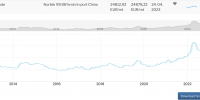
Rio Tinto is an 1873 based British-Australian mining company. Alongside Vale and BHP Billiton, it is one of the three largest mining companies in the world and, since the acquisition of Alcan, the world's leading aluminum producer.
Rio Tinto starts producing lithium in California from old mining waste.
The Rio Tinto Group starts a pilot production of lithium in California and searches out old mining waste, rather than opening new sites, as the battery revolution in electric cars boosts demand for the material.
Recycling landfills from a 90-year-old mining site in the Borough of Kern County has already produced lithium carbonate - needed in rechargeable batteries for electric vehicles and consumer technology, Rio said this week. Efforts are now focused on increasing quality and production volume, the company said.
A pilot plant that was built in Boron for a first phase worth 10 million dollars is expected to produce about 10 tonnes of lithium carbonate equivalent per year by chemically processing material from the mining waste.
The Australian company will consider expanding into the US to become the leading domestic supplier.
In California's Death Valley, boron has been part of a community that has been producing borates since 1872 - materials used in laundry soaps and nuclear reactor components, among other things. There are at least 80 minerals found in material from the site, and the staff first scoured the waste for gold and other elements before discovering lithium, Rio said.
Rio, the world's second largest miner, will next consider an investment of 50 million dollars to build an industrial lithium plant with a capacity of 5.000 tonnes per year, which will be sold to battery manufacturers. This volume would be enough to make batteries for about 15.000 cars of the electric car manufacturer Tesla Inc., the company said.
"If the tests continue to prove successful, it has the potential to become America's largest domestic manufacturer of battery-grade lithium - all without further degradation," said Bold Baatar, chief executive of Rio's energy and minerals division, in a statement . Currently the only supplier in the United States is Albemarle Corp.'s Silver Peak operation. in Nevada, according to the US Geological Survey.
Rio is the first diversified miner to add lithium production to its portfolio, a step ahead of a forthcoming decision to build its mining project in Serbia, which analysts estimate could account for about 5% of global demand.
The demand for lithium will increase about eightfold to 2030, as the acceptance of electric vehicles increases and the battery sector is expanding, BloombergNEF said in a July report. Nevertheless, lithium prices have dropped since mid-2018 and ended a three-year rise as new companies have increased supply and signs of weaker demand are emerging. According to BloombergNEF, there is currently likely to be enough capacity to supply the world market by the middle of the 20s.
Rio has been talking about the electric vehicle sector with key players in the supply chain, and executives have visited China's battery manufacturers, Contemporary Amperex Technology Co. and Tesla, according to the manufacturer's plans, who spoke on anonymity terms because the details of the discussions remained confidential were. Contemporary Amperex Technology declined to comment. Tesla also did not respond immediately to a request for a comment.

Glencore plc is the world's largest commodity trading group. Its operational headquarters are in Baar, Switzerland. The Group was fully privately owned by management and key personnel by May of May 2011. Since its IPO on the London Stock Exchange 2011, Glencore shares have been publicly traded. Glencore is a member of the UK's leading index FTSE 100.
Although Rio's competitors are also adjusting to the growing demand for battery power, their focus is on other commodities. Glencore strives to increase copper, nickel and cobalt production, while the BHP Group is developing specialty nickel and battery cathode products and considers lithium a less attractive option, Chief Financial Officer Peter Beaven said in May.
Regardless, Rio has signed an agreement to enter the rare earth supply chain with the sale of Monazit, a commodity containing the critical elements, the company said. The material is part of the waste stream of the Rio mineral sands plant in Madagascar.
President Trump has raised concerns about the global supply of rare earths and a number of other so-called critical minerals, fearing that China, the dominant supplier of many of the materials, could limit exports.
Rio is also using a $ 10 million Defense Logistics Agency grant to promote the recovery of rhenium needed for jet engines at a copper facility in Utah. And she is working on a project to strengthen the US supply of indium, which is used in touchscreens and solar panels.
ISE / Arndt Uhlendorff - October 2019

